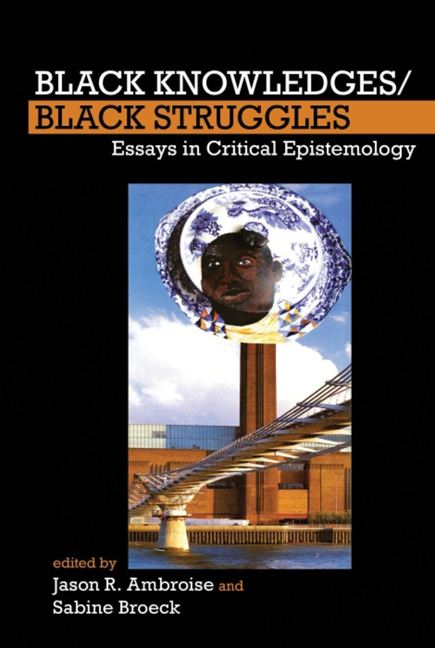Book contents
- Frontmatter
- Contents
- List of Figures
- List of Contributors
- 1 Black Knowledges/Black Struggles: An Introduction
- 2 “Come on Kid, Let's Go Get the Thing”: The Sociogenic Principle and the Being of Being Black/Human
- 3 Respectability and Representation: Black Freemasonry, Race, and Early Free Black Leadership
- 4 Ethno-Class Man and the Inscription of “the Criminal”: On the Formation of Criminology in the USA
- 5 Dehumanization, the Symbolic Gaze, and the Production of Biomedical Knowledge
- 6 Performing Scientificity: Race, Science, and Politics in the USA and Germany after the Second World War
- 7 Imaginary Black Topographies: What are Monuments For?
- 8 The Ceremony Found: Towards the Autopoetic Turn/Overturn, its Autonomy of Human Agency and Extraterritoriality of (Self-)Cognition
- Works Cited
- Index
8 - The Ceremony Found: Towards the Autopoetic Turn/Overturn, its Autonomy of Human Agency and Extraterritoriality of (Self-)Cognition
- Frontmatter
- Contents
- List of Figures
- List of Contributors
- 1 Black Knowledges/Black Struggles: An Introduction
- 2 “Come on Kid, Let's Go Get the Thing”: The Sociogenic Principle and the Being of Being Black/Human
- 3 Respectability and Representation: Black Freemasonry, Race, and Early Free Black Leadership
- 4 Ethno-Class Man and the Inscription of “the Criminal”: On the Formation of Criminology in the USA
- 5 Dehumanization, the Symbolic Gaze, and the Production of Biomedical Knowledge
- 6 Performing Scientificity: Race, Science, and Politics in the USA and Germany after the Second World War
- 7 Imaginary Black Topographies: What are Monuments For?
- 8 The Ceremony Found: Towards the Autopoetic Turn/Overturn, its Autonomy of Human Agency and Extraterritoriality of (Self-)Cognition
- Works Cited
- Index
Summary
The ceremony must be found
Traditional, with all its symbols
ancient as the metaphors in dreams;
strange with never before heard music […]
John Peale Bishop, “Speaking of Poetry” (1933)When asked if he could refute the philosophical position known as idealism – the doctrine that all matter is merely a manifestation of mind – the eighteenth century writer Dr. Johnson is supposed to have responded wordlessly, by kicking a stone. Gravity is the stone that defenders of scientific realism kick: as physicist Alan Sokal said, you can believe what you like about gravity or call it whatever you want, but if I throw you out the window, you'll be just as dead when you hit the ground. Gravity here is supposed to stand for brute fact: the ground, the firm foundation of things. […] It's not the poets and critics of scientific rationality who deny the pull of gravity (usual shorthand for the inescapable “reality” of the world) but the scientists who deny the gravity of language and its being of the world, which is why they keep trying to act like language ultimately doesn't matter. Those who practice this denial distribute its damages widely, but the joke is on them too. [emphasis added]
Ira Livingston, Between Science and Literature:An Introduction to Autopoetics (2006)A UN climate panel is set to release a smoking-gun report soon that confirms human activities are to blame for global warming and that predicts catastrophic global disruptions by 2100. [emphasis added]
Time Magazine, “A Warming Report: Scientists to Show New Evidence” (January 25, 2007)The problem of the twentieth century is the problem of the color line – the relation of the darker to the lighter races of men in Asia and Africa, in America and the islands of the seas. [emphasis added]
W. E. B. Du Bois, The Souls of Black Folk (1903)The Greek roots and related roots of cosmogony are genos/genea (race, family, genealogy, genesis), gonos (offspring) kosmos (cosmos, universe). Thus, cosmo-logia, or cosmolog y, the study of the cosmos, and kosmos and gonos or cosmogony. In our creation myths we tell the world, or at least ourselves, who we are. [emphasis added]
David Leeming, Myth: A Biography of Belief (2002)But who, we?
Jacques Derrida, “The Ends of Man” (1969)- Type
- Chapter
- Information
- Black Knowledges/Black StrugglesEssays in Critical Epistemology, pp. 184 - 245Publisher: Liverpool University PressPrint publication year: 2015



